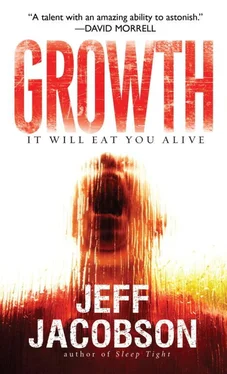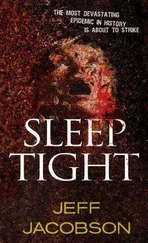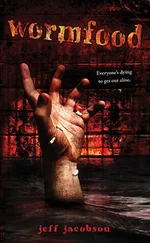Bob sat in the cab and it didn’t look like he was moving much.
Deputy Hendricks finally got the hint that he was supposed to help out. He joined Sheriff Hoyt at the foot of the huge, bright green John Deere combine. Damn thing had tank-like treads for the front drivers, instead of regular wheels. A six-foot ladder rose to the cab. Hendricks hung back and made it clear that he didn’t want to be the first one up there.
Neither paid much attention to the gray cloud that swirled from the spilled corn and rolled out across Main Street.
Sheriff Hoyt started up the steep stairs. He got up to the catwalk and was surprised to find the windows of the cab fogging up or something. It was hard to see inside and he could just make out Bob’s shape, sitting in the bucket seat. He gave it a minute, giving the man a chance to collect himself before he came out and embarrassed himself in front of the whole damn town.
When Bob didn’t move, Sheriff Hoyt knocked on the glass, still polite. He gave it a few moments, but his patience was running out. He knocked again. “Mr. Morton? Bob, that you? Fun’s over. Time to come out now.”
Sheriff Hoyt looked down the ladder at Hendricks, who shrugged. Sheriff Hoyt shook his head. The deputy was about as useless as tits on a boar. He took hold of the door handle, when some instinct, born out of decades of standing guard at the threshold of law and order, keeping the forces of chaos and wild, merciless rage at bay, whispered quietly in the back of his mind. It was the kind of voice he would listen to very carefully if it spoke to him when approaching a strange vehicle or knocking on a quiet door. A sixth sense that he took seriously, but would never acknowledge out loud.
Only this time it had Sandy’s voice.
So he ignored it and opened the cab door.
It took Sheriff Hoyt a few seconds to recognize Bob Morton. He’d never seen anybody this bloated and gray still sitting upright. If he hadn’t seen the man only the day before, Sheriff Hoyt would have sworn that Bob had been pulled out of the Mississippi River after a week or two of festering on the bottom. His first thought was that this was some kind of sick joke, and somebody had stuffed Bob’s dead body in the combine cab.
But then Bob moved his head, and tried to say something.
Sheriff Hoyt leaned closer to listen.
Unintelligible words came out as a kind of wheezing moan. It didn’t look like Bob could fully retract his tongue, and so it poked out from between black teeth, swollen and discolored. He opened his mouth wider and Sheriff Hoyt could see dozens upon dozens of little gray nubs erupting out of his tongue, his gums, the insides of his cheeks. The smallest were the diameter of a single grain of rice, the largest the rounded end of a Q-tip.
Up close, Sheriff Hoyt could now see more of the tiny buds sticking out of Bob’s nostrils, his ears, even pushing out of his eyelids. Bob couldn’t even blink with all those things in the way. From a distance, it looked like someone in a hurry had applied cheap, clumping eyeliner to the farmer’s eyes.
Bob had never been a fitness model, but he had kept himself relatively trim for a man in his fifties. Now, though, his distended stomach almost reached the steering wheel. His fingers were swollen, like sausages that had been left on the grill too long. He wheezed again, his arm flopping against the control console.
Sheriff Hoyt realized he should remove the keys, just in case Bob hit the wrong button. He didn’t want to get any closer, but reached in and as his fingers brushed against the keys, Bob started to make deep, retching sounds.
And just as Sheriff Hoyt managed to twist the keys and kill the engine, Bob’s head exploded in a dry mist, as if someone violently twisted a desiccated orange, popping it open, spitting dried seeds and dusty pulp into the air.
Bob’s torso was next, splitting open in four or five wrenching cracks, spraying the inside of the cab with a dark, wet cloud. Gray slime slid down the windows and dripped from the ergonomic controls.
Sheriff Hoyt caught the blast full in the face and was dead before his knees collapsed. He pitched off the combine and landed on his head in the middle of Main Street.
Deputy Hendricks leaned over him and asked, “You okay, Sheriff?”
The gentle winds took the gray cloud from the cab and the trailer and pushed it playfully every which way into the crowds, up and down the street. There was a single scream, but the spores were met primarily with stupefied confusion. A few people understood that something bad was blowing through the town and tried to gather their families and run.
By then, it was all too late.
Sandy spun in a circle, taking it in, the hulking barn, the burning house, the smoldering cars, the dead man on the lawn, and surrounding it all, the green, whispering, waiting corn. She’d seen Cochran’s monsters crawling over the man in the basement, and now she had no doubt that the fields were full of them. And maybe even worse things.
She had to get to town to find Kevin. Something in Sheriff Hoyt’s voice, just before he clicked off, had raised the hairs on the back of her neck. She had no doubt that whatever havoc this corn fungus was wreaking out in the fields had spread somehow to the center of Parker’s Mill.
But she had no vehicle, no phone, and even the radio was useless now, thanks to Sheriff Hoyt. She took one last glance around, making sure she wasn’t forgetting something, and started down the driveway at a jog. As she ran, she kept her eyes at the edge of the corn on either side of the gravel driveway. She hoped Cochran was right about the things wanting to stay out of the sunlight. Either way, she stayed in the center of the driveway all the way out to the highway.
The Johnsons had to have heard all the shooting and Sandy wouldn’t have been surprised if Meredith had been keeping an eye on all the unfamiliar traffic heading up the driveway to the Einhorn farm. Sandy hoped she had already called 911 again. The call would have been rerouted to the Manchester County Sheriff’s Department, but she didn’t care as long as they sent somebody out to investigate.
Sandy crossed Highway 17 and ran up to the front door. The possibility that the Johnsons were at the parade occurred to her as she ran. Sandy didn’t know if that would be considered too secular or just patriotic. If they were in town, she didn’t think it would be difficult to smash a window and climb inside to use their phone. Meredith would undoubtedly file some sort of official complaint, but Sandy didn’t particularly give a damn.
Sandy hit the doorbell and listened for movement inside. They had to know she was here. She knocked first, then pounded on the door. No response. The house was silent.
She knew this place didn’t have a basement and went to the big picture windows, cupped her hands to her eyes, and peered inside. The windows looked out from the combination living and dining room. The living room had a simple couch and a recliner. The ancient TV was still a piece of furniture in and of itself, wedged into a corner near the front door. A small, circular table filled the dining room. A beige and yellow kitchen waited beyond. All were empty.
She ran around to the back and saw that the big Suburban was still parked in front of the garage and a huge pile of firewood. It looked like they were still home. She went up to the sliding glass back door, stopping a moment when she noticed a stack of fire extinguishers on the patio. Peering at the gauges, she saw that they were all empty.
Sandy tried the sliding glass back door and it slid open. She stepped inside. “Meredith? Albert? You guys home?” It felt like an echo of the Einhorn farmhouse; no one was there. She left the door open and searched through the rest of the first floor. It smelled like something had died under the house. The kids’ rooms were full of bunk beds and crayon drawings of Jesus, but no children.
Читать дальше












